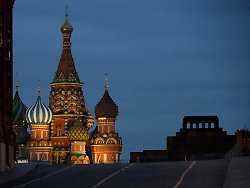Kremlin speaks of “farce”
Is Russia bankrupt?
06/27/2022, 10:10 am
Russia faces its first default on foreign debt in more than 100 years. The government assures that it is able and willing to transfer the money. But Western sanctions prevent that.
Russia is nearing its first default on foreign debt since the Bolshevik revolution more than 100 years ago. Several Taiwanese investors said they had not received any of the agreed interest payments on their Russian government bonds by Sunday evening. However, it is legally disputed whether the deadline for the government in Moscow to pay its creditors actually expired at the weekend. Some lawyers argue that the Kremlin has until Monday evening because Sunday is not a working day.
But then at the latest, the usual 30-day period expires, within which interest on two government bonds in foreign currency had to be paid – 29 million euros for a government bond running until 2036 and $71 million for a bond running until 2026. Actually, Russia was supposed to make the payments on May 27, but it didn’t happen. A grace period of 30 days then automatically started, which is now ending.
However, there is currently no sign that investors are getting their money. Since the invasion of Ukraine on February 24, sweeping sanctions have made it difficult for Russia to access the global financial system. Therefore, although Russia earns a lot of money from the sale of raw materials and has large foreign exchange reserves, Moscow cannot pay the required interest.
“Artificial Insolvency”
According to the Ministry of Finance in Moscow, Russia made the payments for the bonds in euros and dollars to its central securities depository NSD. However, it is considered unlikely that the funds will find their way to the many international holders.
The Kremlin has repeatedly stated that it sees no reason for default. Finance Minister Anton Siluanov described the situation as a “farce”. Russia is only unable to transfer money to the bondholders because of the sanctions. The West wants to drive the country into an artificial insolvency.
As for Russia’s potential for new borrowing, a formal default would initially be largely symbolic given that Moscow is currently unable to borrow internationally anyway, and thanks to its rich oil and gas revenues, it doesn’t have to. But a technical failure would likely increase its borrowing costs in the future — and probably will for many years to come. In addition, creditors may seek court seizures of Russian state property abroad.
